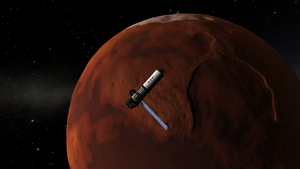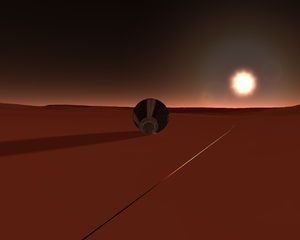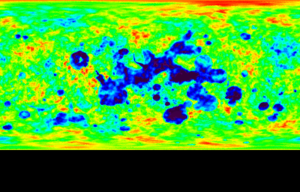Difference between revisions of "Duna"
(Added ground map) |
|||
| Line 35: | Line 35: | ||
[[File:DunaSurface.png|thumb|left|Duna's surface at Dawn.]] | [[File:DunaSurface.png|thumb|left|Duna's surface at Dawn.]] | ||
[[File:Duna_isa_mapsat.png|thumb|left|A topographic map of Duna made with the ISA MapSat plugin]] | [[File:Duna_isa_mapsat.png|thumb|left|A topographic map of Duna made with the ISA MapSat plugin]] | ||
| − | [[File:Duna_projection.png|thumb|left|A false color Mercator | + | [[File:Duna_projection.png|thumb|left|A false color Mercator projection of Duna's surface using MapSat.]] |
Duna is a iron-rich planet which has greatly varying land altitude, the consequence of which is very difficult judgment of a safe landing position. Its mountainous ranges are a peril to landing craft, especially considering the thin atmosphere, where very little aerobraking can be done safely. It is important to slow one's ship down before coming into the atmosphere, to ensure a safe decent. Its two poles are very expansive and are the result of a thin atmosphere. | Duna is a iron-rich planet which has greatly varying land altitude, the consequence of which is very difficult judgment of a safe landing position. Its mountainous ranges are a peril to landing craft, especially considering the thin atmosphere, where very little aerobraking can be done safely. It is important to slow one's ship down before coming into the atmosphere, to ensure a safe decent. Its two poles are very expansive and are the result of a thin atmosphere. | ||
Revision as of 02:46, 27 September 2012
Duna is the fourth planet of the Kerbol star system. It is the Mars analog for Kerbal Space Program and is mostly red with polar icecaps.
Topography
Duna is a iron-rich planet which has greatly varying land altitude, the consequence of which is very difficult judgment of a safe landing position. Its mountainous ranges are a peril to landing craft, especially considering the thin atmosphere, where very little aerobraking can be done safely. It is important to slow one's ship down before coming into the atmosphere, to ensure a safe decent. Its two poles are very expansive and are the result of a thin atmosphere.
Atmosphere
Duna's atmosphere begins at approximately 41km and is only 20% as dense as Kerbin's. (A nuclear engine has a specific impulse of 220 at 1 atm, 800 in vacuum, and 684.2 at Duna altitude 5 m. This means the Duna atmospheric pressure at 5 m is roughly 1 - (684.2 - 220) / (800 - 220) = 0.1997 atm.)
Parachutes work at lower efficiency than on Kerbin, making powered descent necessary when landing from orbit (unless your craft is just a pod with a parachute).
Natural Satellites
Duna's only natural satellite is the moon Ike, and due to it's size and closeness to the planet, they are tidally locked to each other.
See Also


